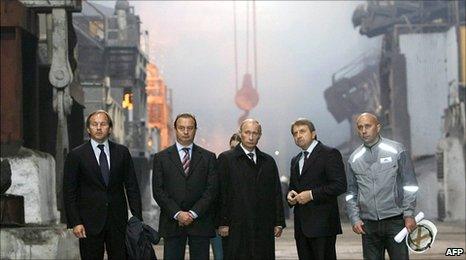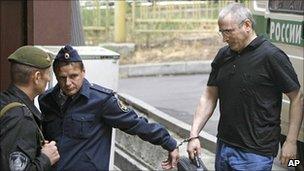Russia's government avoids Norilsk Nickel battle
- Published

Mr Putin visited the city of Norilsk but did not intervene in the shareholders' dispute
Russia's government and entrepreneurs have taken steps to improve the country's global image as a reliable business partner, but some recent events must have given them a headache.
Russia, eager to position itself as a trusted exporter after its gas conflicts with Ukraine and Belarus, had to introduce a grain export ban because of a severe drought in the country.
And while this setback could be blamed on nature, another story that is being closely followed by investors is entirely man-made.
Two main shareholders in Norilsk Nickel, the world's largest nickel and palladium producer, have been at war since June, when one of them, aluminium company Rusal, lost a seat on Norilsk's board.
Rusal, the world's leading aluminium producer, is controlled by billionaire Oleg Deripaska, once the richest man in Russia.
The other main shareholder is Interros, which is also controlled by a prominent Russian billionaire, Vladimir Potanin.
Rusal and Interros each hold a 25% stake in Norilsk Nickel, and Rusal accused Interros of gaining unfair influence in the company - something Interros and Norilsk's management strongly deny.
Igor Repin, deputy head of the Investor Protection Association, believes that this conflict could potentially happen in any country.
But, he adds, the main question is how fast and in what kind of manner it will be resolved.
Need of investment
Russia has the reputation of a country where investors' rights have been poorly protected.

Former Yukos chief executive Mikhail Khodorkovsky has been behind bars since 2003
For years, the state has been seen as a force ready to intervene in almost any shareholder dispute in order to gain control over an attractive company or a project.
For example, in 2006, Russian environmental officials said that the owners of the huge Sakhalin-2 integrated oil and gas project had violated a number of environmental regulations.
Several months later, when Russian state monopoly Gazprom bought a controlling stake in the project from its shareholders - foreign companies Royal Dutch Shell, Mitsui and Mitsubishi - the dispute was settled.
In one of the most notorious cases of Russian state companies eventually taking over a private firm, oil giant Yukos was dismantled, while its founder, Mikhail Khodorkovsky, has been behind bars since the end of 2003.
Chris Weafer, chief strategist at Russian investment bank Uralsib, believes that Norilsk Nickel is one of the companies the state would love to add to "its list of national champions".
But, he says, the situation is now different to how things were several years ago, as the government needs the investment money to finance its huge privatisation agenda if projects like "Russia's Silicon Valley" and economic diversification are to work.
"It cannot afford another Sakhalin/Yukos, quite the opposite, it has to take great care to improve Russia's investment credentials," says Mr Weafer.
"The government is now firmly on the side of minorities, albeit by default."
'Right and wrong'
When it was announced in August that Prime Minister Vladimir Putin would go to the northern Russian city of Norilsk, where Norilsk Nickel's largest operations are located, many experts were sure that the state was ready to intervene.
The government was expected to become the third and decisive force in the company, not least because the city fully depends on the wellbeing of Norilsk Nickel and Russian officials have been eager to avoid any social unrest.
But these expectations did not materialise. Instead, Mr Putin said at the meeting in Norilsk: "Shareholders, management and the government have been working on the company's problems and it seems to me there is some movement forward."
Mikhail Khazin, president of the consulting firm Neoсon, believes that an important reason why the state has not intervened so far is "because it is not a situation when one side is clearly right and the other is clearly wrong, which was the case with Sakhalin and some other projects".
Indeed, despite the earned reputation, the Russian government has not directly interfered with a number of other shareholder disputes.
In 2008, oil giant BP and its Russian billionaire partners were at war in joint venture TNK-BP. Many experts expected the conflict to result in some form of nationalisation of the company.
However, the battle ended with the resignation of TNK-BP boss Robert Dudley, who was accused by the Russian shareholders of favouring BP's interests. Meanwhile, both sides retained their stakes.
Pragmatic solutions
The Norilsk Nickel shareholders' conflict is not the only one in Russia. There have been similar ones in some other companies - from big telecom firms to supermarkets and shops.
But this particular dispute is seen as the case that could help define "the rules of the game" in the market and create precedents to be used in future, because the two sides of the conflict are really big, says Mr Repin.
He also says that the situation "shows the shortcomings we have in corporate governance".
For example, in 2008, when Mr Deripaska's Rusal became a major shareholder in Norilsk Nickel, a shareholder agreement was struck between Rusal and Interros.
Back then, Mr Repin explains, there was no law regulating this kind of deal. So, the shareholders were not able to dispute it in Russia, having to take it to London.
Rusal now says that Interros has breached the part of the agreement in terms of the two sides' representation on Norilsk's board.
Brook Horowitz, executive director for Russia at the International Business Leaders Forum, believes that the battle of the shareholders shows that Russia is in the middle of its business development.
Indeed, in the 1990s a great number of Russian companies were the objects of conflicts between competing businessmen. Some of those conflicts even resulted in killings.
"Now what we are seeing is a rather public debate, and it looks as though it will be resolved in due course," says Mr Horowitz.
"Those kind of pragmatic solutions will be more and more common as Russia integrates with the global economy."
For more about the Norilsk Nickel shareholders' conflict and the Russian economy watch Russia Business Report on BBC World News this weekend: on Saturday, 25 September at 0430 GMT and 1730 GMT and on Sunday, 26 September at 1030 GMT and 2330 GMT.